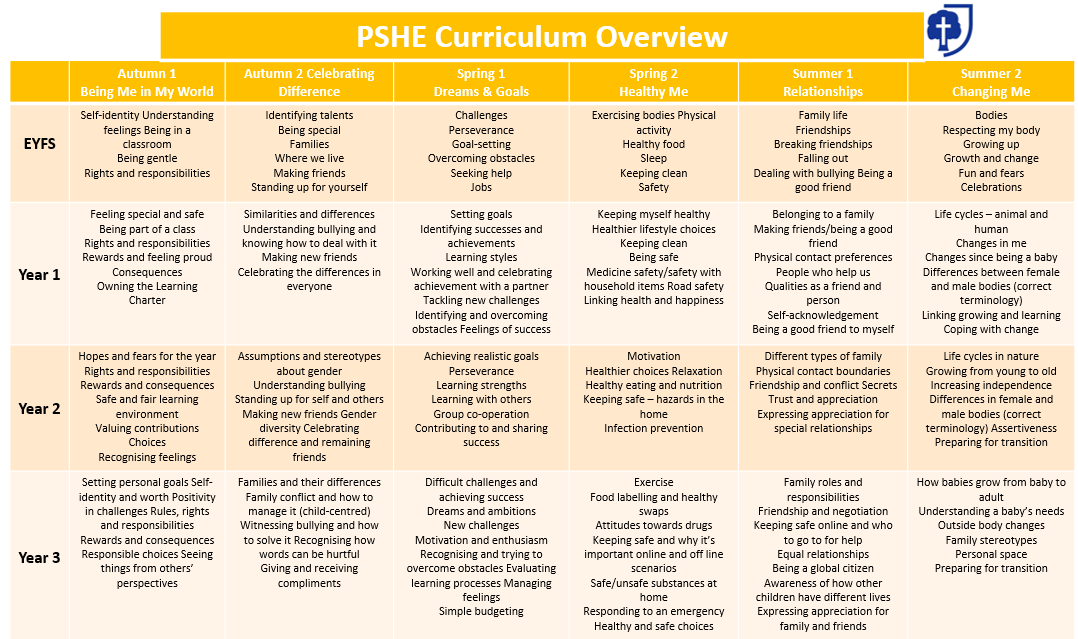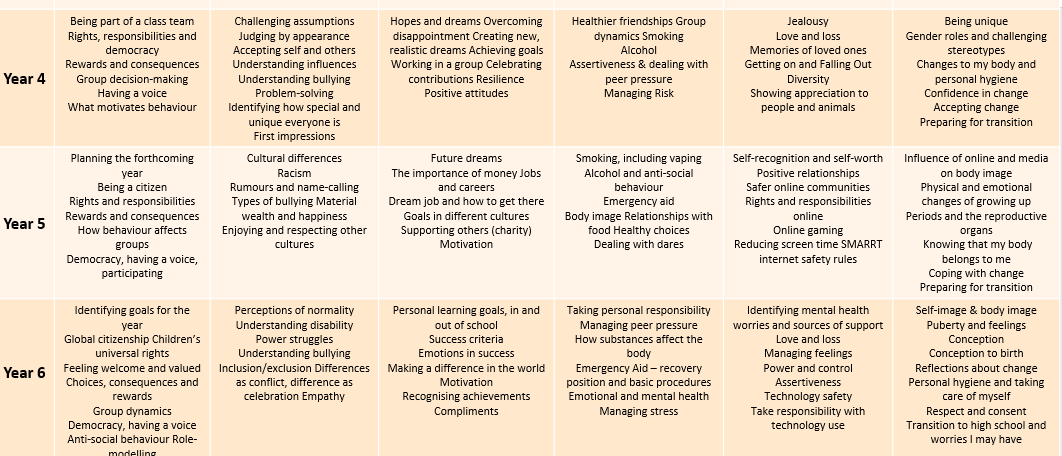Personal Social Health Economic - PSHE
PSHE Education Intent Statement
Introductory statement
In PSHE, our curriculum focuses on providing pupils with the knowledge, skills and attributes they need to keep them safe, healthy, productive and live fulfilled lives in modern Britain. We believe that PSHE should also enable children to reflect on and clarify their own values and attitudes, and explore the complex and sometimes conflicting range of values and attitudes they encounter now and in the future. PSHE education is therefore also about developing young people’s sense of identity, their capacity to relate to other people and handle setbacks. At Didsbury CE, we focus on developing pupils’ emotional literacy which we feel is crucial to developing well-rounded individuals. PSHE lessons contribute to the development of self-awareness, social skills, managing feelings, motivation and empathy. We are committed to pupil’s well-being and personal development in order to help them thrive across the whole curriculum.
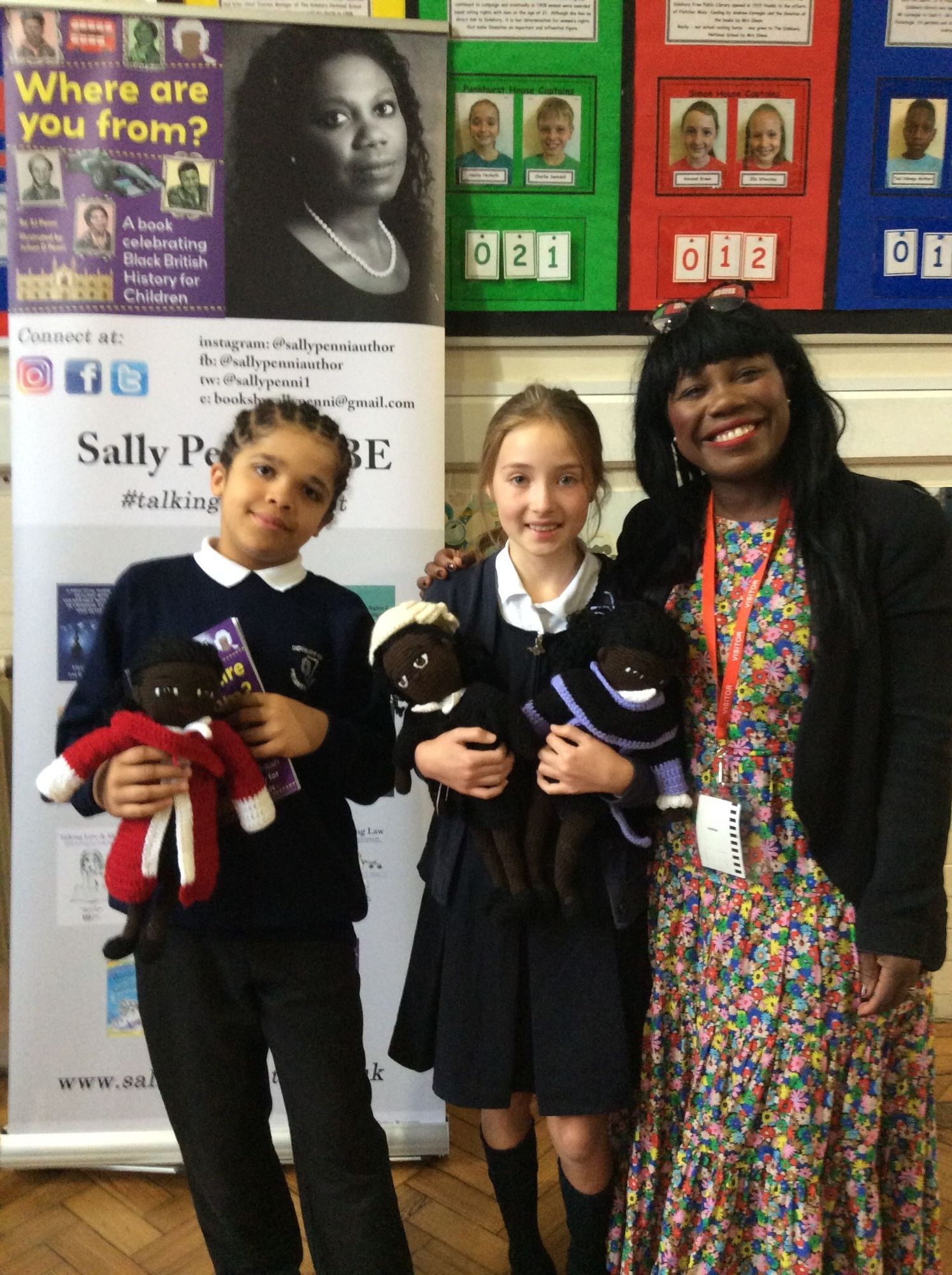
A curriculum for life for all regardless of background
Throughout the school, our curriculum is ambitious and generally parents and carers also encourage high expectations of learning. It is important that these high expectations are managed in a way that pupils do not feel overwhelmed and under pressure; instead, learning should be enjoyable. At Didsbury CE, we want to ensure that pupils’ well-being is prioritised, with a focus on growth mindset and an ethos of cherishing the efforts of pupils rather than just the achievements. Our PSHE lessons also provide an opportunity for ‘Calm Me’ time where pupils focus on freeing their minds of worries and concentrate on their breathing and mindfulness.
Furthermore, we place importance on helping our pupils become resilient, knowing how to respond in difficult or unexpected situations. We believe that whatever a child’s social background, being resilient; having the ability to bounce back; seeing failure as opportunity to learn; and coping with adversity are all integral to learning and managing life now and in the future.
Curriculum end points
The PSHE curriculum is designed with clear knowledge and social skills end points at the end of each unit. The units are consistent but progressive through the year groups. These can be found below.
By the end of Year 6, we hope that children have acquired the knowledge, skills and experiences which will equip them for secondary school. These include, but are not limited to, the following:
- Understanding of self and the importance of health and well-being.
- Understanding of relationships.
- Understanding of living in the wider world and how to contribute to living in a happy society.
Curriculum planning and sequencing
Across the school, the units are taught at the same time. This is because they are planned throughout the year at key points e.g Celebrating Difference links to Anti-Bullying Week; Changing Me links to transition to the next year group.
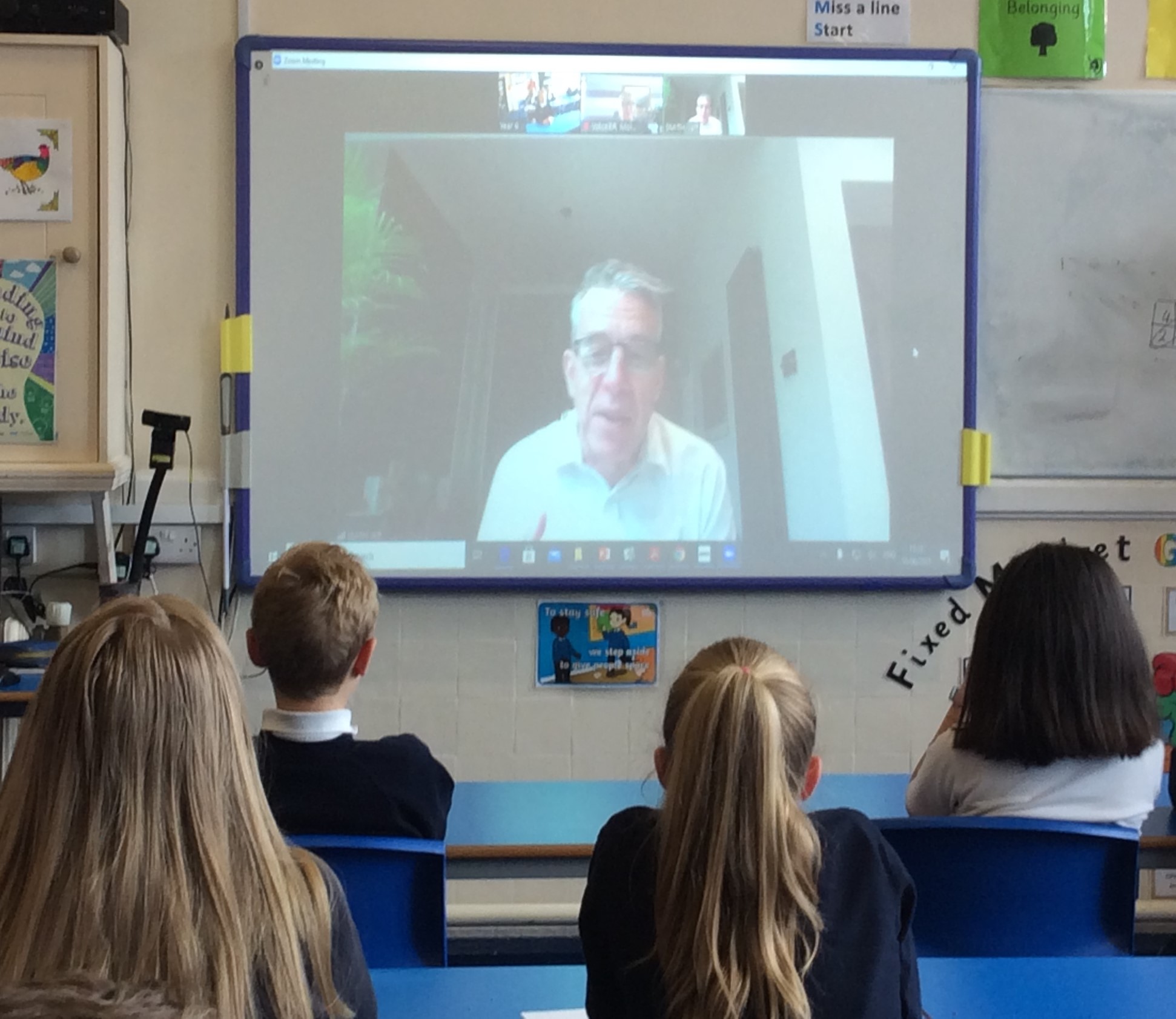
Reflecting the local context
In PSHE, we recognise the importance of being flexible and ensuring that time is spent on current issues or events as they arise. When fundraising for local and national charities, we ensue that effort is made for pupils to understand the context and feel part of the bigger picture of making a difference. We celebrate and utilise opportunities to learn about the lives of local people who have made a difference e.g taking part in a march to unveil the statue of Emiline Pankhurst.
Furthermore, throughout many aspects of school life, we value democracy. Going beyond this, our Year 6 class have visited Manchester Library to learn about the battle of Peterloo and the history of democracy for Manchester. We have also had a visit from our local MP, with many pupils writing to him about issues they are passionate about from parking problems in the village to climate change.
We are very fortunate to have the fantastic Didsbury Park on our doorstep and throughout the school, classes use this excellent resource to connect with nature and enhance the curriculum.
A broad and balanced curriculum
At Didsbury CE, it has been a long-standing belief that a broad and balanced curriculum is essential for pupils in all year groups as each subject offers valuable opportunities to extend learning. PSHE is no different to that. In EYFS, pupils have a PSHE 20 minute circle time and in Years 1-6, lessons are 1 hour long.
As part of our PSHE lessons, we often link these skills and values to high-quality books in which characters and themes provide discussion points. In PSHE, we encourage high standards of literacy with a particular focus on speaking and listening: pupils are encouraged to engage, discuss, listen, debate, report, research, explain and explore. As pupils progress through the school, there is greater expectation on a comprehensive written reflection where pupils are encouraged to express complex issues coherently.
In Year 6, in January, pupils take part in Young Enterprise Week which involves pupils collaborating to create a new product and a marketing campaign to support it. This is then presented to a panel of judges, often governors and people from the local community. This excellent experience for pupils allows them to develop vital skills for the future.
High academic ambition
PSHE goes beyond academic learning and ‘knowing things’, with a focus on helping pupils develop their emotional intelligence which not only helps them understand themselves but their relationships and also the wider world.
PSHE is crucial to children’s development. We recognise that in order for many children to be able to access and enjoy other subjects such as English and maths, they need to be ambitious, resilient, motivated and self-aware. PSHE allows pupils to develop the skills they need to be successful. Pupils who may struggle with these areas have extra support to practise, deepen or embed these skills further.
Inclusivity is at the heart of our lessons with all pupils valued. To support the differentiation, many PSHE lessons include creative learning activities that allow children to choose the media with which they work and give them scope to work to their full potential. Other ways in which pupils are supported in PSHE are as follows:
- Word banks with pictures for pupils to help describe feelings.
- Use of the Jigsaw soft toy to explain a situation through an anonymous character.
- Writing templates with prompt questions and suggested vocabulary.
- Social communication booster groups held in addition to the PSHE lessons.
This inclusive approach allows all children the opportunity to reach their potential.
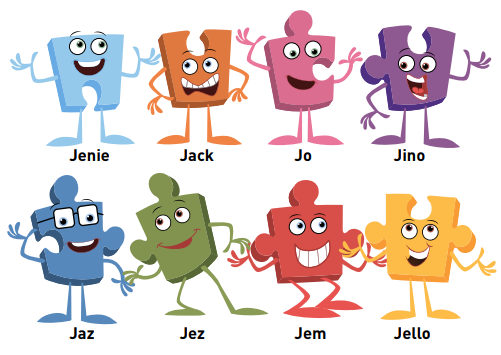
Implementation – how we teach what we teach
We believe it is important to establish a safe learning environment. We will create a safe and supportive learning environment by creating a ‘Class Charter’ at the beginning of the year (referring to it each half term) which all pupils in each class agree on. We will ensure that where pupils indicate that they may be vulnerable and at risk, they will get appropriate support by following our Mental Health and Well-Being Identification Procedure (please see the Mental Health and Well-Being Policy).

The lessons are designed with the child in mind, as though they are asking the teacher to:
• Improve their social skills to better enable collaborative learning (Connect us)
• Prepare them for learning (Calm me)
• Help the brain to focus on specific learning intentions (Open my mind)
• Initiate new learning (Tell me or show me)
• Facilitate learning activities to reinforce the new learning (Let me learn)
• Support them in reflecting on their learning and personal development (Help me reflect)
Impact – how we measure what we teach
The impact of our PSHE curriculum is that pupils will feel confident that they have the appropriate knowledge, skills and attributes they need to keep themselves healthy and safe, and prepare for life and work in modern Britain. In PSHE we take a more collaborative approach to assessment with both pupils and teachers completing an assessment overview sheet at the end of each half-termly theme. The personal nature of PSHE means that it is important pupils have regular opportunities to reflect on and identify what they have learned, what needs to be learned next and what they need to do to continue their learning. The teacher will then contribute their guidance of what the pupil’s successes are and what they should try to work on next half term.
The final teacher’s assessment of PSHE is reported on formally to parents at the end of each academic year. The progress of each child will be tracked throughout their time at Didsbury CE Primary.
